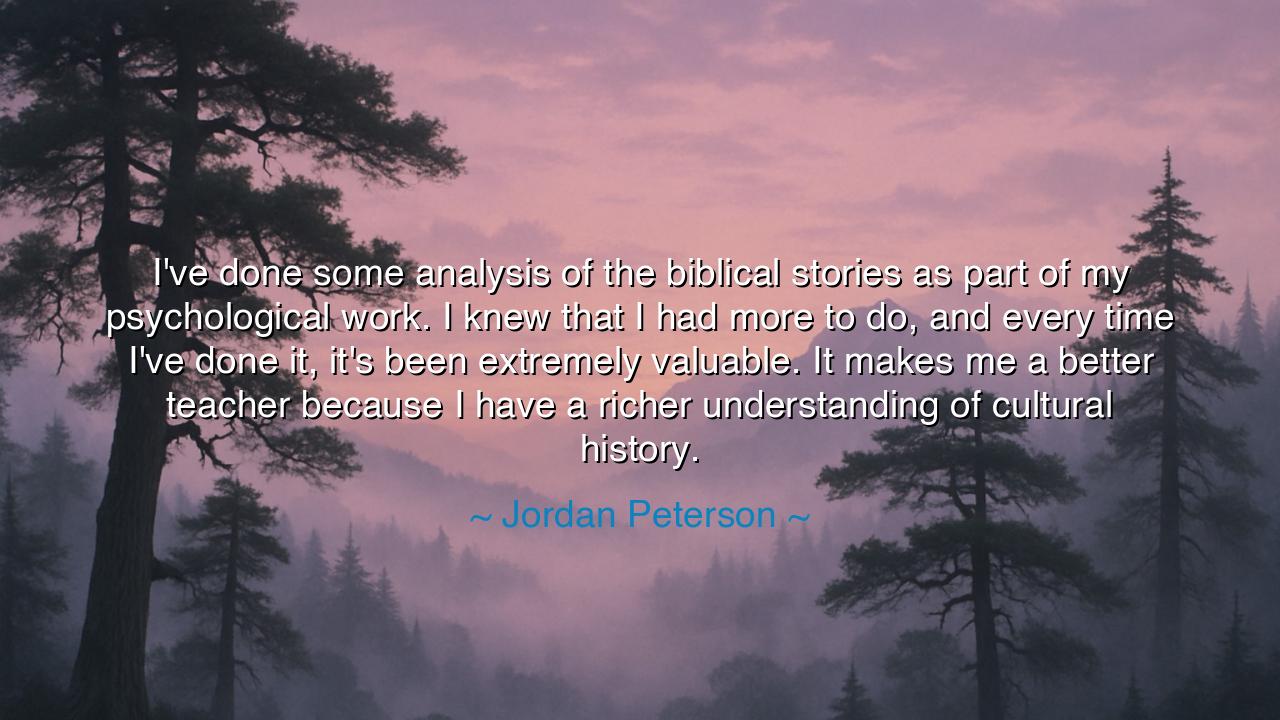
I've done some analysis of the biblical stories as part of my
I've done some analysis of the biblical stories as part of my psychological work. I knew that I had more to do, and every time I've done it, it's been extremely valuable. It makes me a better teacher because I have a richer understanding of cultural history.






In the reflective words of Jordan Peterson, we find the recognition of the deep river from which wisdom flows: “I’ve done some analysis of the biblical stories as part of my psychological work. I knew that I had more to do, and every time I’ve done it, it’s been extremely valuable. It makes me a better teacher because I have a richer understanding of cultural history.” These words remind us that the truths of the past, though wrapped in ancient language and myth, still breathe life into the present. For in every old tale lies a map of the human soul, waiting to be rediscovered by those bold enough to seek it.
To study the biblical stories is not merely to study religion, but to peer into the wellspring of culture itself. These stories, carried across centuries, shaped laws, morality, and the very imaginations of nations. They are not dead relics, but living archetypes that speak to the struggles of courage, temptation, suffering, and redemption. When Peterson turned his analysis to these tales, he did not do so as a preacher, but as a seeker of psychological truth, finding within them patterns of the mind and struggles of the heart that remain as relevant now as in the days they were first spoken.
Such exploration makes one a better teacher, for the teacher’s role is not merely to pass on information, but to illuminate meaning. A teacher with only facts instructs the mind, but a teacher who draws from the depths of cultural history awakens the soul. Peterson confesses that each time he returned to these old stories, he found new treasures. This is the way of the ancients: the same story, when read again, does not reveal the same lesson, but speaks differently as we ourselves grow. Thus, the sacred stories are mirrors that reflect not only eternal truths but also the present state of the seeker.
History shows us many who drew greatness from such study. Dante Alighieri, in his Divine Comedy, wove biblical and classical imagery into a journey of the soul, revealing truths that continue to move readers centuries later. Carl Jung, whose shadow hovers over Peterson’s work, studied ancient myths and scriptures to uncover the archetypes of the collective unconscious. Both understood that without knowledge of these cultural roots, one cannot truly grasp the human psyche. For just as a tree cannot flourish without its roots, the modern mind cannot flourish without memory of the past.
The meaning of Peterson’s words is this: that wisdom requires more than knowledge—it requires depth. By engaging with the ancient stories, we see ourselves in them; we learn of sacrifice from Abraham, courage from David, suffering and redemption from Job, and wisdom from Solomon. Each figure is not only a character in a book but an echo within our own lives. To ignore these stories is to walk blindly, but to embrace them is to enrich the soul and prepare it for the trials of existence.
The lesson is simple yet profound: if you would grow in understanding, do not only study the present—study the past. Do not dismiss old tales as irrelevant, but listen to them as if they were spoken yesterday, for their wisdom is timeless. If you are a teacher, let these stories guide your teaching; if you are a student, let them shape your character. By doing so, you will not only learn facts but inherit the deep memory of civilization, which strengthens and steadies the human spirit.
In practice, this means returning often to the well of ancient texts—whether biblical, mythological, or historical. Read them not only with the eye of belief but also with the mind of inquiry, asking what they say about fear, hope, love, and endurance. Write about them, speak of them, share them with others, and apply their lessons to your own trials. In so doing, you carry forward the wisdom of countless generations, adding your voice to the chorus of human history.
Thus, Peterson’s words stand as a modern echo of an ancient truth: the stories of old are not dead, but alive; and he who studies them becomes more than a scholar—he becomes a bearer of wisdom. Let us, then, walk this path, drawing from the past to strengthen the present, and teaching others not only what to think, but how to live.






AAdministratorAdministrator
Welcome, honored guests. Please leave a comment, we will respond soon